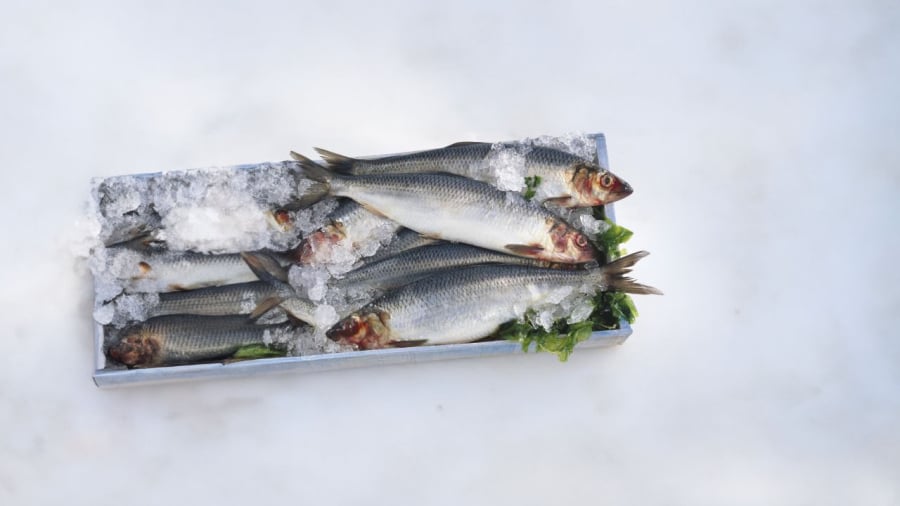When it comes to salmon, many people praise its high omega-3 content for its benefits in promoting eye health, supporting heart health, and enhancing brain development. One serving of salmon can provide up to 2,150 mg of omega-3 fatty acids, along with high-quality protein and other nutrients such as vitamin D, selenium, and vitamin B. Salmon is considered a luxurious food worldwide, especially in Vietnam where its price is relatively high due to the costs of preservation and transportation.
In Vietnam, there is a type of fish that is highly regarded for its omega-3 content. One serving of mackerel can also provide up to 2,150 mg of omega-3 fatty acids. However, the price of mackerel in Vietnam is only about 80,000 Vietnamese dong, and in local coastal areas, it can be as low as 40-50,000 Vietnamese dong. This price is 4-5 times cheaper compared to salmon.

Especially, mackerel contains less mercury compared to salmon
When it comes to nutrition recommendations, experts often mention the importance of consuming healthy fatty fish, but these fish also have a higher risk of mercury contamination. Among the high-mercury fish are salmon and tuna. Mercury is a heavy metal that can cause neurological toxicity, especially in young children. Therefore, choosing mackerel instead of salmon, or combining them, is a smart choice. It not only helps increase omega-3 intake but also reduces the risk of mercury contamination.
Mackerel is also used as a raw material for omega-3 fish oil supplements worldwide.
Omega-3 is a beneficial fatty acid that reduces the risk of cardiovascular diseases. Omega-3 helps reduce neutral fats, increase good cholesterol, prevent stroke by preventing plaque buildup in arteries, and blood clots in the body.

Mackerel can be cooked into many delicious dishes
Compared to salmon, mackerel can be cooked into many delicious dishes that are suitable for the Vietnamese culinary culture, such as mackerel salad, braised mackerel, grilled mackerel, mackerel with tomato sauce, crispy fried mackerel, etc.
Therefore, mackerel is more versatile in family meals and can meet the dietary preferences of adults and children.
Benefits of mackerel
In addition to its high omega-3 and low mercury content, mackerel has many other benefits:
Mackerel is rich in protein
Like many other types of fish, mackerel is a good source of protein, which is superior to the protein found in pork and beef. Mackerel also has low calories, making it suitable for weight loss diets.
Mackerel is rich in antioxidants and vitamins
Mackerel is rich in powerful antioxidants, especially vitamin E and selenium, which neutralize free radicals and reduce the harmful effects of oxidative stress, thus slowing down the aging process. Mackerel is also an excellent source of vitamin D, which reduces the risk of diseases such as cancer and heart disease. Additionally, mackerel contains various other vitamins and minerals such as vitamin B12, vitamin B3, phosphorus, and potassium.

Mackerel helps prevent anemia
Mackerel is high in iron, which helps increase blood production in the body. Anemia is a serious condition that can cause fatigue and lead to other diseases. Adding mackerel to your diet can help improve overall health and boost the immune system.
Mackerel enhances brain health
The omega-3 fatty acids EPA and DHA in mackerel are beneficial nutrients that improve memory, reduce stress, and enhance mood. In particular, vitamin B12 in mackerel supports better nervous system function in humans.
Strengthens bones
Mackerel is rich in vitamin D and calcium, two essential nutrients for strong bones. Consuming mackerel can help reverse muscle and bone loss in older adults.
“3 Simple Steps to Remove the Fishy Smell of Salmon”
Are you looking for ways to get rid of that unpleasant fishy smell associated with salmon dishes? If so, we have some useful tips that can help you make a delicious and healthy meal without the fishy odor. Keep reading to learn our easy-to-follow suggestions for removing the odorous smell from salmon dishes!
Exploring Natural Foods for Allergy Relief
Dealing with allergies can be difficult and uncomfortable, especially for young children. Allergens such as pollen, cosmetics, and insects can cause serious issues for those affected. However, knowledge of the symptoms and taking the necessary precautions can help alleviate the troublesome effects of allergies, like itching, sneezing, and irritation.


































